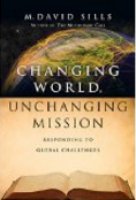Changing World Unchanging Mission: Responding to Global Challenges gives the reader much to think about in engaging the world with the gospel of Jesus Christ. In this book, David Sills seeks to answer two questions: “What can we learn from the ways past changes affected missions? What place should the future have in informing the ways we currently do missions?” (Kindle Location 50–51, all references henceforth are to the Kindle locations). David Sills has both the experience and expertise to help answer these questions. He has served as a missionary in Ecuador working with indigenous tribes in the Andes Mountains. He was president of a seminary in Quito, Ecuador. For over ten years he has taught at The Southern Baptist Theological Seminary. His final credential would be starting and leading as the President of Reaching and Teaching International Ministries, a missions agency focused on theological education for pastors and indigenous church planting.
By design, the book is geared more for mission agencies, missionaries, and missions students. In ten chapters, Sills covers an array of current mission trends. In each chapter, a brief history of the current trend is evaluated after which several options for engagement are offered. His critiques of the past are balanced with a fair evaluation and an optimistic future outlook. The book is not designed to be an in-depth study of all current mission practices with substantial exegesis.
Sills weaves through the chapters his primary missiological emphasis—“The tragedy of the world is not that it is unreached but that it is undiscipled” (128). Discipling believers is the answer for the various problems facing the world today. While some may consider this simplistic, it is biblical (Matt 28:18–20) and practical. Changing World Unchanging Mission is the practical application in different scenarios.
When looking at business as mission (BAM), Sills offers this helpful thought, “Must Western missionaries be the front-line missionaries? Perhaps our most creative access would be to go to countries that we can enter more easily, and disciple, train, and equip believers there to go to countries that may be closed to US citizens but more accessible to them” (2058–2060). Sills revisits this theme when he interacts with the church in the Global South (Chapter 10). The Global South has more believers than the traditional church in the West. Though the West has more money and better technology, these are not enough to reach the world. Some may suggest digitizing and sending technological devices to disciple believers. However, Sills says, “The majority prefers a person to teach them— someone to explain face-to-face and someone to walk down the road of life with them. Technology is a wonderful blessing and will be increasingly adopted by peoples around the world, but most still prefer the message in human form to disciple, correct, clarify and model” (1306–1308).
Even though this book is targeted towards a Western audience, it does not champion the Western missionary as the world’s only hope of hearing the gospel. Sills writes, “Nationals must be trained to fulfill the task, not only because we could never amass enough missionaries to do the task but also in order for everyone to do what God is calling them to do” (2726–2728). When is someone discipled? Sills gives his answer, “True success in evangelism, discipleship and theological education is achieved when new believers can understand, remember and retell what they have learned” (1339–1340).
Sills devotes an entire chapter to the role of the church in sending missionaries (Chapter 7). He emphasizes the role and priority of the church to send missionaries. However, he does suggest that churches partner with agencies because of the challenges of sending missionaries. Agencies under- stand language learning, missiology, culture shock, raising children overseas, and team dynamics with more experience than local churches. When churches partner with agencies they must align theologically and missiologically. Newer agencies, such as Reaching and Teaching exist because traditional agencies have narrowed their missiological focus.
The chapter with the greatest weakness is Helping without Hurting (Chapter 6). With the chapter title, the reader would expect an excerpt and more interaction with current social justice books, When Helping Hurts, Toxic Charity, Serving with Eyes Wide Open, etc. Instead of interacting with the different models addressed in these books, Sills gives more open-ended questions to the various situations presented within the chapter. While this is a de nite weakness it also aligns with Sills’ attempt to be more general and get the reader thinking about current trends. He offers 6 R’s to guide missionaries, namely, rescue, relief, rebuild, restore, reconcile, and redeem. Once again, the emphasis is on empowering the indigenous.
If you are looking for a comprehensive treatment of current trends in missions then this book is not for you. However, if you want out-of-the-box thinking about current missions trends then read this book. While Sills says his target audience comprises current missions practitioners or students, I would suggest that the book be read by missions-minded pastors, missions committees, and any missions-minded Christian.
The book would benefit with questions at the end of each chapter for discussion. I imagine a missions committee or small group discussing the chapters in the book each week. Each chapter would be a great discussion starter for churches to evaluate past mission experiences and plan for future missions encounters. I recommend that you put Changing World Unchanging Mission on your reading list.
